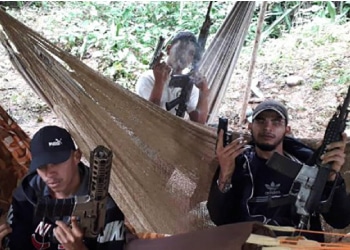The escalating violence between security forces and a gang in Venezuela’s foremost mining region shows how the breakdown of criminal and political alliances can lead to open conflict.
Over the last year and a half, the El Perú Syndicate (Sindicato del Perú) – a gang that extorts illegal miners and operates crude gold processing plants in southern Bolívar state – has been the target of repeated operations by Venezuelan security forces. Several of its members have been arrested or killed, although its two top leaders, known only as alias “Toto” and “Zacarías,” remain at large.
SEE ALSO: Enemies to Allies – How Venezuela Decides Which Criminal Groups Thrive
Despite being vastly outnumbered, the criminal gang has fought back against the authorities. In late March, two of its members intercepted a truck transporting Wuihelm Torrellas Martínez, a politician and former member of Venezuela’s National Constituent Assembly. They took Torrellas Martínez hostage and demanded 15 kilograms of gold (worth over $500,000) for his release. While the politician managed to escape, his captors reportedly beheaded his bodyguard, according to Venezuelan media reports.
In April, a video circulated in which a member of the El Perú Syndicate, surrounded by masked gang members armed with assault rifles, made a veiled reference to Torrellas Martínez’s kidnapping, saying “a hostage doesn’t escape if his captors don’t let him go,” El Pitazo reported.
In the video, the gang member also demanded that President Nicolás Maduro send a commission within 78 hours to investigate crimes committed by security forces in the El Callao municipality, the group’s stronghold. If these conditions were not met, the group said, it would attack security forces in Bolívar and elsewhere in the country.
The national government responded by sending troops to El Callao and issuing a curfew for residents, according to a report by El Pitazo. The increased military presence in the area led to members of the gang moving into other mining areas in Bolívar, like Nacupay.
And yet, last year, the group seemed to be on its knees. In September 2020, after ten of its members were reported killed in a month, El Perú Syndicate addressed another video to Maduro, asking for “dialogue as we find ourselves in a war without meaning to defend our human rights, to defend our work, to defend our people” and claiming to have been fighting armed forces for seven years.
InSight Crime Analysis
The El Perú Syndicate has apparently run afoul of a government plan to control Bolívar’s mining region. The flow of hard currency from gold sales is increasingly critical for keeping the regime afloat.
Bolívar state is at the heart of the Orinoco Mining Belt (Arco Minero de Orinoco) – rich in gold, diamonds, bauxite, coltan and other valuable minerals.
Referring to themselves as syndicates, criminal gangs like El Perú came to control much of the illegal mining in the Orinoco region. Meanwhile, local government officials protected their operations and even provided them with weapons, according to reports by former members of security forces in Bolívar state.
SEE ALSO: Gold and Chaos: Gang Lords Rule Venezuela’s Orinoco Mining Arc
But the arrival in 2018 of Bolívar Governor Justo Noguera Pietri – a former National Guard officer sanctioned for money laundering by Panama and the US Treasury Department – upended the fortunes of such groups, particularly the El Perú Syndicate.
Upon Noguera Pietri’s arrival, the army and military counterintelligence officials received the order to penetrate the territories controlled by the El Perú Syndicate, according to sources close to the government who spoke to InSight Crime under the condition of anonymity.
The El Perú Syndicate has clearly been weakened since then and its direct appeal to President Maduro smacks of desperation. Still, it has refused to go quietly. The kidnapping of Torrellas, a member of the official party, is evidence of the power it still wields in its local stronghold.

